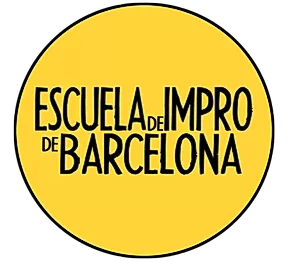Why are some conversations engaging, smoothly moving from point to point while others die off in a couple of round-trips and a final monosyllable? Why can you rapidly build chemistry with some people and have false starts with others?
Lately I’ve been taking some improvisation theater classes, improv for connoisseurs, and the experience has shed some light on these questions and proven useful for the real-life world™.
First, improv is more about self-expression and play than about performing theater in front of an audience, at least at the amateur level. Your typical class has an initial warm-up phase in which some exercises wake you up by physically moving, interacting, or maybe shouting and then you play some games in which you practice the different skills you need to improvise scenes. Finally, you play some improvisation games in which everything is unpredictable but within some guidelines.
For example, one popular improv game called the statues consists of having someone freeze in a pose and then a new actor steps in and starts a scene somehow using such a pose to justify it. At some random point, the teacher will clap and both actors will freeze. Then the cycle restarts when a third actor replaces one of the frozen ones. This exercise is a constant surprise as the photo finish of a scene that started with skiing becomes a do-you-wanna-marry-me one and so on.
This game is representative of elements in improv: some structure or rules, a ton of unpredictability, a sense of building something together and the joy of letting yourself play like you were a child again.
As I’m a total noob and the course is introductory, we focus on the fundamentals that can be summarized as accepting and adding or with the motto yes and…. This was surprising to me as I was expecting something more related to acting but it makes a lot of sense. Usually you improvise in pairs or bigger groups and when someone proposes something it’s of paramount importance to be generous and selfless in order to accept that proposal, not doing so breaks the flow and destroys the spirit of the game. In improv’s jargon it’s called negation and recognizing and avoiding it is one of the first things you are taught.
Negation is the ultimate wet-blanket. Imagine that one actor braces herself and say “It… it’s veery cold up here in the mo-mountain”; then the other negates her with “I’m a fish in the ocean.” The first actor will be disoriented not knowing what to do… even angry at her companion.
Compare this with the opposite to negation: accepting and building on top of that. “It… it’s veery cold up here in the mo-mountain” followed by “Don’t falter now that we are so close to top of the Everest and to win the bet”. Now, the first actor can fill in more details about that enigmatic bet.
Apart from having learned some jargon like negation, PROL1, bouncing; and from having had a ton of fun I got a lesson to apply back to my regular life: yes and… is the missing ingredient to make conversations more engaging and to build chemistry faster in some other situations. Think about this: who do you prefer to go on in a holiday trip with? With someone that accept other’s proposals and build on top of them or with someone that systematically rejects anything but his or her own verbatim will?
-
PROL: Persona, Role, Objective and Locale ↩
 I've been taking classes here ☝️
I've been taking classes here ☝️